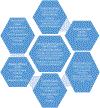Enhancing Dementia Education and Cognitive Screening in A Haitian Population: A Faith-based Approach
- PMID: 33949259
- PMCID: PMC8456582
- DOI: 10.1080/07370016.2021.1887566
Enhancing Dementia Education and Cognitive Screening in A Haitian Population: A Faith-based Approach
Abstract
Ethnically diverse Americans experience 1.8-2.5 times higher risk of developing Alzheimer's disease than Whites (Mayeda, et al., 2016), yet cognitive screening is not routinely conducted among Haitian American communities. Dementia risk awareness is beneficial for improving management of chronic illness and behaviors that impact risk of cognitive decline. A quasiexperimental paired samples t-test design was employed to test the effectiveness of an educational intervention among 50 older faith- based Haitian adults using the Basic Knowledge of Alzheimer's Disease (BKAD) scale, cognitive screening using the Cognitive State Test (COST), and referrals to a local memory/wellness center. A significant difference was seen in knowledge scores: pre-test (M = 18.5, SD = 3.12) and post-test (M = 23.1, SD = 2.42); conditions t(41.9) = -9.5, p = .000. All of those who volunteered for screening completed follow-up neuropsychological evaluations. Outreach to faith-based settings is suggested as an avenue for improving dementia knowledge and detection.
Conflict of interest statement
We have no Conflicts of Interest.
Figures
Similar articles
-
Overcoming the COVID-19 Pandemic for Dementia Research: Engaging Rural, Older, Racially and Ethnically Diverse Church Attendees in Remote Recruitment, Intervention and Assessment.Gerontol Geriatr Med. 2021 Nov 20;7:23337214211058919. doi: 10.1177/23337214211058919. eCollection 2021 Jan-Dec. Gerontol Geriatr Med. 2021. PMID: 34825019 Free PMC article.
-
[The estimation of premorbid intelligence levels in French speakers].Encephale. 2005 Jan-Feb;31(1 Pt 1):31-43. doi: 10.1016/s0013-7006(05)82370-x. Encephale. 2005. PMID: 15971638 French.
-
Relationship of dementia screening tests with biomarkers of Alzheimer's disease.Brain. 2010 Nov;133(11):3290-300. doi: 10.1093/brain/awq204. Epub 2010 Sep 7. Brain. 2010. PMID: 20823087 Free PMC article.
-
Cognition and the Predictive Utility of Three Risk Scores in an Ethnically Diverse Sample.J Alzheimers Dis. 2020;75(3):1049-1059. doi: 10.3233/JAD-191284. J Alzheimers Dis. 2020. PMID: 32390625 Free PMC article.
-
Faith Community Nurses Key to Promoting Health in At-Risk Communities: An Integrative Review.J Christ Nurs. 2022 Oct-Dec 01;39(4):E85. doi: 10.1097/CNJ.0000000000001009. J Christ Nurs. 2022. PMID: 36048610 Review. No abstract available.
Cited by
-
Testing the 'Faith Moves Mountains model' to increase Alzheimer's disease awareness, detection, and diagnosis among rural, racially, and ethnically diverse older adults.Aging Ment Health. 2024 Jun;28(6):943-956. doi: 10.1080/13607863.2023.2294062. Epub 2023 Dec 21. Aging Ment Health. 2024. PMID: 38127408 Free PMC article.
-
Assessing Alzheimer's Disease Knowledge and Cognitive Risk Among a Rural Older Afro-Caribbean Cohort.J Community Health Nurs. 2024 Jan 2;41(1):1-10. doi: 10.1080/07370016.2023.2257199. Epub 2023 Sep 13. J Community Health Nurs. 2024. PMID: 37705286 Free PMC article.
-
Attitudes toward dementia and cognitive aging among Syrian refugees resettled in Jordan: a qualitative study.BMC Public Health. 2023 Nov 22;23(1):2307. doi: 10.1186/s12889-023-17183-5. BMC Public Health. 2023. PMID: 37990313 Free PMC article.
-
Interventions to promote dementia knowledge among racial/ethnic minority groups: A systematic review.J Am Geriatr Soc. 2022 Feb;70(2):609-621. doi: 10.1111/jgs.17495. Epub 2021 Oct 10. J Am Geriatr Soc. 2022. PMID: 34628641 Free PMC article.
-
Overcoming the COVID-19 Pandemic for Dementia Research: Engaging Rural, Older, Racially and Ethnically Diverse Church Attendees in Remote Recruitment, Intervention and Assessment.Gerontol Geriatr Med. 2021 Nov 20;7:23337214211058919. doi: 10.1177/23337214211058919. eCollection 2021 Jan-Dec. Gerontol Geriatr Med. 2021. PMID: 34825019 Free PMC article.
References
-
- Alzheimer’s Association and Center for Disease Control and Prevention (2013). The Healthy Brain Initiative: The Public Health Road Map for State and National Partnerships, 2013–2018. https://www.cdc.gov/aging/pdf/2013-healthy-brain-initiative.pdf
-
- Colin JM (2006). Cultural and clinical care for Haitians [PowerPoint slides]. https://www.in.gov/isdh/files/Haiti_Cultural_and_Clinical_Care_Presentat...
MeSH terms
Grants and funding
LinkOut - more resources
Full Text Sources
Other Literature Sources
Medical

